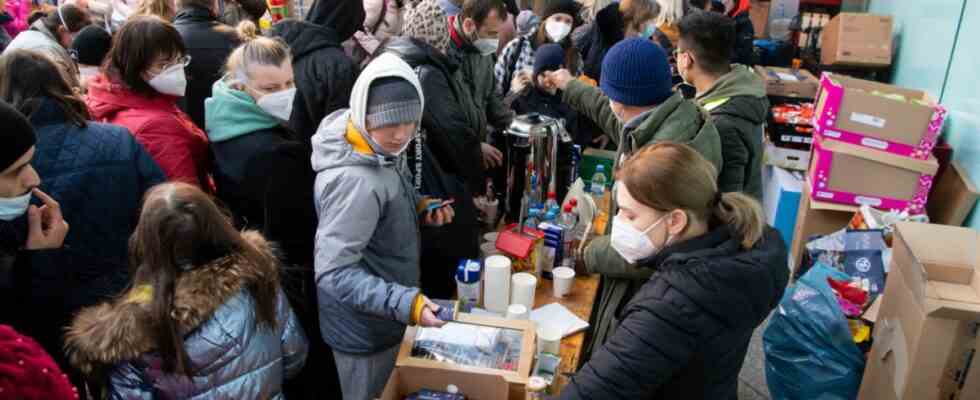The city is desperately looking for accommodation for people from Ukraine. Mayor Dieter Reiter (SPD) spoke of a “dramatic challenge” on Friday when he visited the main train station again. You don’t know when how many people will arrive – and how long they will stay. “The longer this war lasts, the less likely it is that they will soon be able to go back to Ukraine,” said Reiter. “We have arrival figures that exceed anything we thought in a forecast a week ago.” Practically all halls in the city are currently being checked for their suitability, said Reiter in an interview with the Süddeutsche Zeitung, also the exhibition center and the Small Olympic Hall. Even the construction of a tent city is being considered (SZ Plus).
According to social officer Dorothee Schiwy (SPD), 1,500 people from Ukraine arrived in Munich on Thursday, and another 800 arrived on Friday night. Similar numbers are expected in the coming days, said Schiwy, “if not more”. A special train with 1,500 people is scheduled to arrive on Saturday. In order to make planning at least a little easier, the railway and federal police should inform the city in the future when trains with large groups arrive.
The arrivals can go to the new arrival center from now on. It started operations on Friday and is located in the Hotel Regent, diagonally opposite the main train station. The refugees are registered there, explains Edith Petry, spokeswoman for the social department. It will be clarified who wants to continue traveling and who will stay in Munich. In addition, refugees will be advised and the next steps will be explained to them: For example, how they can get a residence permit if they want it. “In addition, people are placed here in both municipal and private housing,” says Petry. Before registering, the refugees are tested for corona – those who are positive must go into quarantine in the hotel.
The city has rented the Hotel Regent near the main train station for ten months.
(Photo: Stephan Rumpf)
According to the spokeswoman, going to the arrival center is not mandatory. Refugees can also register online: if you know how it works and where you want to go, you can do it. “But most of them don’t know,” says Petry, for them the center is an offer. The city has rented the hotel for ten months. At the same time, the federal police are planning to put rooms in the main train station into operation and record who is arriving and who has a passport.
Then the people have to be distributed to accommodation. The city has created additional capacities for this: according to current planning, people are to be accommodated in sports halls at several vocational schools and in hotels for the time being. These include the vocational school on Bergmannstrasse on the Schwanthalerhöhe and the one on Riesstrasse in Moosach. According to Petry, there will be space for 200 to 300 people in the future. 300 sleeping places are also to be created in the vocational school on Schleißheimer Straße in Nordheide. In the Hotel Star G in Schwabing, capacity was increased by 100 beds to 220. People can also be accommodated in the Hotel Regent, which houses the new arrivals centre: there are 420 beds in 200 rooms. Why schools are used in particular has to do with the fact that a disaster protection plan is used: it has been developed over the years, explains Schiwy.
The archdiocese wants to take in refugees
The Catholic Church also wants to help: The Archdiocese of Munich and Freising has called on its approximately 750 parishes in Upper Bavaria to take in refugees and to make available living space available. In addition, the city was offered the Paulinum student residence in Maxvorstadt, which is currently closed. Apartments and rooms are also available in the archdiocese’s conference centers such as Fürstenried Castle.
Until sufficient accommodation is found, the situation will remain difficult for the helpers at the main station. Many of the people arrive at the station, in the side wing helpers give out warm food to refugees and distribute, among other things, diapers, baby food in glasses and chocolate bars. “A lot is unclear,” reports Nadja Wolfsbauer from Caritas. On Wednesday she accompanied people on foot to the sleeping places in the Luisengymnasium, she says, but that is no longer available. Where people are supposed to go now, they often don’t know here. “Communication should be better,” says Wolfsbauer. Her Caritas colleague Bettina Riedl adds that people are reluctant to be sent somewhere where they have to leave after a few days. “And most of them don’t even know whether they need something in the short or long term.”
the “Advent calendar for good works of the Süddeutsche Zeitung” offers support to people in need – these days especially those fleeing the war in Ukraine. If you want to help, you can donate to the SZ Advent calendar:
“Advent calendar for good works of the Süddeutsche Zeitung eV”
Stadtsparkasse Munich
IBAN: DE86 7015 0000 0000 6007 00
BIC: SSKMDEMMXXX
Purpose: Ukraine
You can donate online here. Every donation goes to a good cause without any deductions. Süddeutsche Verlag bears all material and administrative costs. An overview of the other options available for providing aid to war victims can be found at: www.sz.de/ukrainehilfe

